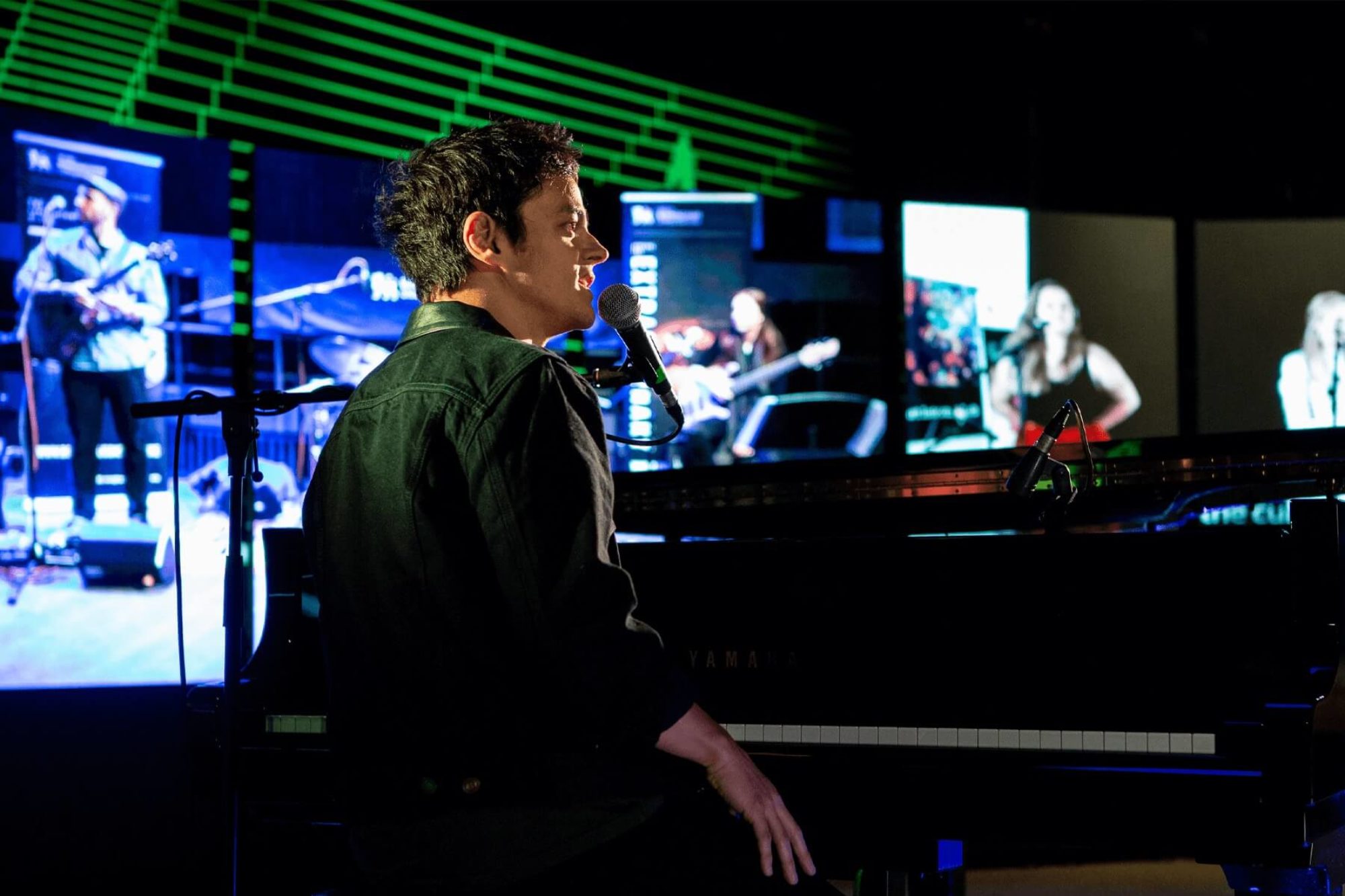Jamie Cullum leads world’s first 5G music lesson for music-making charity
Posted 26 Jun 2019
Award-winning jazz pianist, Jamie Cullum, led the world’s first 5G music lesson from his piano at the two thousand year-old Roman Amphitheatre in London, playing live with amateur musicians in Bristol and Birmingham using 5G technology from EE, King’s College London, Smart Internet Lab at the University of Bristol and Digital Catapult.
The event, from the charity Music for All, demonstrates how technology can remove barriers to learning. The advent of 5G technology will ultimately deliver super low-latency (i.e. low delay) connectivity everywhere, enabling an Internet of Skills where skills can be shared with others wherever they may live, work and play.
Here, we are bringing together music teachers and aspiring musicians. Research shows that making music: helps people of all ages, backgrounds and abilities to keep smarter, younger, healthier and more sociable.
An ambassador of the charity Music for All, Cullum taught musicians across the three different venues in a unique multi-site lesson, connecting the three cities across the UK, as if the musicians were playing in the same room. The locations included City of London Corporation’s Amphitheatre, Birmingham City University – Royal Birmingham Conservatoire, and We The Curious in Bristol.
Musicians were connected from London to Birmingham via EE’s 5G network, and from the capital to Bristol via the 5GUK Test Network between King’s College London and the Smart Internet Lab at the University of Bristol.
Commenting on this project, Jamie Cullum, said: “I’m delighted to be part of this ground-breaking event. I believe that the future of music can evolve hugely by adopting the latest technologies, like 5G. Having the privilege to perform with others via the power of 5G can open up new opportunities for artists, enabling them to practise and perform together remotely and communicate at a level that we never thought possible.”
Julian Lloyd Webber, principal of Royal Birmingham Conservatoire, said: “As a world leading institution providing diverse music education opportunities to a broad range of students in a state of the art building, we are absolutely delighted to partner in this global first. Access to exceptional music-making sits at the very heart of the Royal Birmingham Conservatoire, and our significant investment in technology and venues – including the Eastside Jazz Club – ensures a vibrant and memorable experience for all. We look forward to further exploring the possibilities of 5G in music education following the success of this fantastic artistic endeavour.”
David Marshall, chairman of Music for All, said: “At Music for All we believe that by spreading the benefits of making music, we can change people’s lives for the better. The amateur musicians in Jamie’s 5G band really reflect our ethos as any musician from any background could apply for a place. The increasing availability of 5G technology will open up new ways for us to help more people in more places.”
Dritan Kaleshi, Head of Technology – 5G and 5G Fellow at Digital Catapult, said: “5G unlocks a range of benefits that will have a transformative impact on people’s lives. Digital Catapult has already played a vital role in the first live orchestral performance across three different venues using 5G, in partnership with leading UK universities working in 5G, and providing deep technical expertise and equipment from our 5G Testbed in London to help make this project a success. It’s a wonderful demonstration of what 5G can do and what it enables, way and above the technology itself.”
The amateur musicians in Jamie’s 5G band were selected from an open call for applications by Jamie. The band included singer Lexi Milligan, guitarist and singer Jeremy Levif, singer and saxophonist Rosie Patton, singer and keyboard player Taylor Paisley-French, drummer Jakob Terry and bassist Alyson Knott. The band played one track from Jamie’s recently released album – Taller – and one classic track to an audience of thousands across the three locations and via live stream.
The event was hosted by the City of London Corporation at The Roman Amphitheatre and led by Music for All, supported by King’s College London, Birmingham City University – Royal Birmingham Conservatoire, EE, Yamaha, the City of London Corporation, the Smart Internet Lab at the University of Bristol, We The Curious, and Digital Catapult.